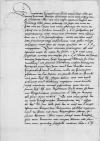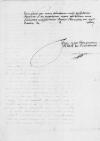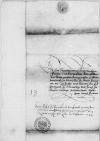Wie wir aus negster gehaltner Provincial Diet of Royal Prussia ⌊thagfartProvincial Diet of Royal Prussia ⌋ von Graudenz (Grudziądz, Graudentium), city in Poland, Voivodeship of Pomerania, on the upper east bank of the Vistula, Graudenz (taking turns with Marienburg (Malbork)) was the venue for the Provincial Diet of Royal Prussia, which were chaired by the bishop of Ermland (Warmia)⌊GraudentzGraudenz (Grudziądz, Graudentium), city in Poland, Voivodeship of Pomerania, on the upper east bank of the Vistula, Graudenz (taking turns with Marienburg (Malbork)) was the venue for the Provincial Diet of Royal Prussia, which were chaired by the bishop of Ermland (Warmia)⌋ bisher seinn gelanngt / ist zeiger dits, / einer des adels aus der Poland (Kingdom of Poland, Polonia)⌊CronnPoland (Kingdom of Poland, Polonia)⌋ ann unns gekomenn, / der unns angetzeigt / das er sich inn diennst zw E(urer) F(urstlichen) D(urchlauch)t zu begebenn hab vorgenhomenn, / vonn unns mit sonndrem vleis bittend / ihnn an E(uer) F(urstliche) D(urchlauch)t zuvorshreibenn / welchs wir ihm auff solchs sein innstendigs anfurdrenn / nicht haben mugen vorsagenn, / unnd ihm dis unnser shreibenn an E(ure) F(urstliche) D(urchlauch)t mitgegebenn. /
Vonn newenn zeittungenn ist auf dissmhal nichts bei unns, / das zuvor E(urer) F(urstlichen) D(urchlauch)t nicht were zugebracht, / nemlich wie tapffer sich E(urer) F(urstlichen) D(urchlauch)t vetter der durchlauchtig hochgebornn furst marggraff Albrecht of Brandenburg (Albrecht von Hohenzollern) (*1490 – †1545), 1499-1545 co-Margrave of Brandenburg (together with his brother Joachim I Nestor), 1513-1545 Archbishop of Magdeburg, 1514-1545 Elector and Archbishop of Mayence, 1518 elevated to cardinal; son of Johann Cicero, Prince-Elector of Brandenburg, and Margarete of Saxony (daughter of Wilhelm III von Sachsen)⌊Albrecht zw BrandennburgAlbrecht of Brandenburg (Albrecht von Hohenzollern) (*1490 – †1545), 1499-1545 co-Margrave of Brandenburg (together with his brother Joachim I Nestor), 1513-1545 Archbishop of Magdeburg, 1514-1545 Elector and Archbishop of Mayence, 1518 elevated to cardinal; son of Johann Cicero, Prince-Elector of Brandenburg, and Margarete of Saxony (daughter of Wilhelm III von Sachsen)⌋ etc. mit seinenn reutternn nebenn hertzogenn Moritz of Saxony (Moritz von Wettin) (*1521 – †1553), 1541-1547 Duke of Saxony, 1547-1553 Elector of Saxony; initially he was a supporter of his cousin Johann Friedrich von Wettin, leader of the German Protestants, but in 1542 they fell into conflict, and Moritz joined the imperial party. During the Schmalkaldic war, he supported Emperor Charles V. In 1552 he led a rebellion against the Emperor⌊Moritzenn vonn MeissennMoritz of Saxony (Moritz von Wettin) (*1521 – †1553), 1541-1547 Duke of Saxony, 1547-1553 Elector of Saxony; initially he was a supporter of his cousin Johann Friedrich von Wettin, leader of the German Protestants, but in 1542 they fell into conflict, and Moritz joined the imperial party. During the Schmalkaldic war, he supported Emperor Charles V. In 1552 he led a rebellion against the Emperor⌋ / unnd dem graffen vonn Furstenbergk / unnd andrenn / wider die The French ⌊FrantzosennThe French ⌋ gehaltenn, / die Saint-Dizier, town in northeastern France (Champagne-Ardenne), halfway between Strasbourg and Paris⌊San DesideriSaint-Dizier, town in northeastern France (Champagne-Ardenne), halfway between Strasbourg and Paris⌋, ein starcke stadt in France (Gallia, Francia), the kingdom⌊FranckreichFrance (Gallia, Francia), the kingdom⌋ vonn Charles V of Habsburg (*1500 – †1558), ruler of the Burgundian territories (1506-1555), King of Spain as Charles I (1516-1556), King of Naples and Sicily, King of the Romans (1519-1530), Holy Roman Emperor of the German Nation (elected 1519, crowned 1530, abdicated 1556); son of Philip I the Handsome and Joanna the Mad of Castile⌊kaÿ(serliche)r m(ajeste)tCharles V of Habsburg (*1500 – †1558), ruler of the Burgundian territories (1506-1555), King of Spain as Charles I (1516-1556), King of Naples and Sicily, King of the Romans (1519-1530), Holy Roman Emperor of the German Nation (elected 1519, crowned 1530, abdicated 1556); son of Philip I the Handsome and Joanna the Mad of Castile⌋ belegert, / habenn wolt mit volck, / profanndt unnd besoldunge entsetzenn, / unnd daruber erlegt wurdenn, / wiewol geshriebenn wirt / das am sturm kaÿ(serlich)e m(ajeste)t ann derselbtenn stadt etwan shadenn ann kriegsleuthenn genhomenn, / so soldt sie dannoch uberhoupt seinn eröbert. /
Es wirt auch gesagt / das der newe deutzshmeister administrator VIII-c[1] reszige / bei Charles V of Habsburg (*1500 – †1558), ruler of the Burgundian territories (1506-1555), King of Spain as Charles I (1516-1556), King of Naples and Sicily, King of the Romans (1519-1530), Holy Roman Emperor of the German Nation (elected 1519, crowned 1530, abdicated 1556); son of Philip I the Handsome and Joanna the Mad of Castile⌊kaÿ(serliche)r m(ajeste)tCharles V of Habsburg (*1500 – †1558), ruler of the Burgundian territories (1506-1555), King of Spain as Charles I (1516-1556), King of Naples and Sicily, King of the Romans (1519-1530), Holy Roman Emperor of the German Nation (elected 1519, crowned 1530, abdicated 1556); son of Philip I the Handsome and Joanna the Mad of Castile⌋ im felde habe, / das es auch den The English (Angli) ⌊EnngellishennThe English (Angli) ⌋ vor Boulogne-sur-Mer, city in northern France, 1544-1550 occupied by the English⌊BologneBoulogne-sur-Mer, city in northern France, 1544-1550 occupied by the English⌋ inn Brittany (Armorica, Bretogne), region in northwestern France⌊BertaniennBrittany (Armorica, Bretogne), region in northwestern France⌋ glucklich ergangen / unnd vor Paris (Lutetia Parisiorum, Parisii), city in central France, on the Seine river, capital of France⌊ParisParis (Lutetia Parisiorum, Parisii), city in central France, on the Seine river, capital of France⌋ mit denn kaÿserishenn sollenn zwsamne komenn. / Wirt unns sonnst vonn koniglich(en) hove, / vonn dannenn wir unnsers botenn alle stundenn seinn gewertig, / zugeshickt, / wollenn solchs E(urer) F(urstlichen) D(urchlauch)t  GStAPK, HBA, C1, No. 985, f. 2unnumbered derer gunst wir unns bevelhenn / nicht vorhaltenn, / bittennde / so die dergleichenn etwas uberkueme unns freuntlich mitzuteilenn. /
GStAPK, HBA, C1, No. 985, f. 2unnumbered derer gunst wir unns bevelhenn / nicht vorhaltenn, / bittennde / so die dergleichenn etwas uberkueme unns freuntlich mitzuteilenn. /
 GStAPK, HBA, C1, No. 985, f. 3unnumbered
GStAPK, HBA, C1, No. 985, f. 3unnumbered
 GStAPK, HBA, C1, No. 985, f. 1unnumbered
GStAPK, HBA, C1, No. 985, f. 1unnumbered
 GStAPK, HBA, C1, No. 985, f. 2unnumbered derer gunst wir unns bevelhenn / nicht vorhaltenn, / bittennde / so die dergleichenn etwas uberkueme unns freuntlich mitzuteilenn. /
GStAPK, HBA, C1, No. 985, f. 2unnumbered derer gunst wir unns bevelhenn / nicht vorhaltenn, / bittennde / so die dergleichenn etwas uberkueme unns freuntlich mitzuteilenn. /


